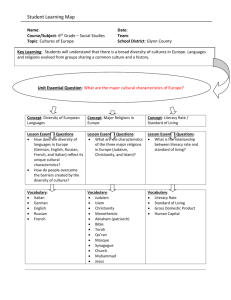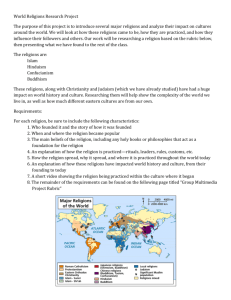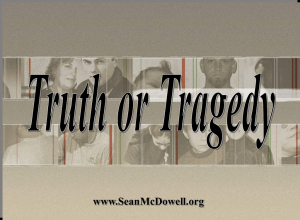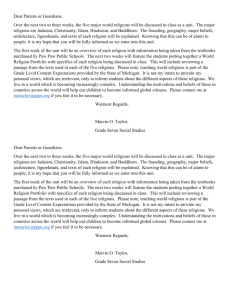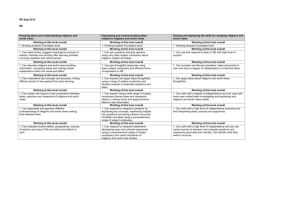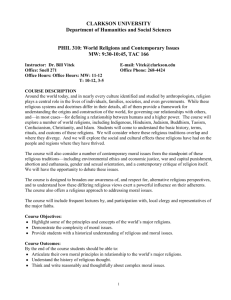reli21501 - Heartland Community College
advertisement
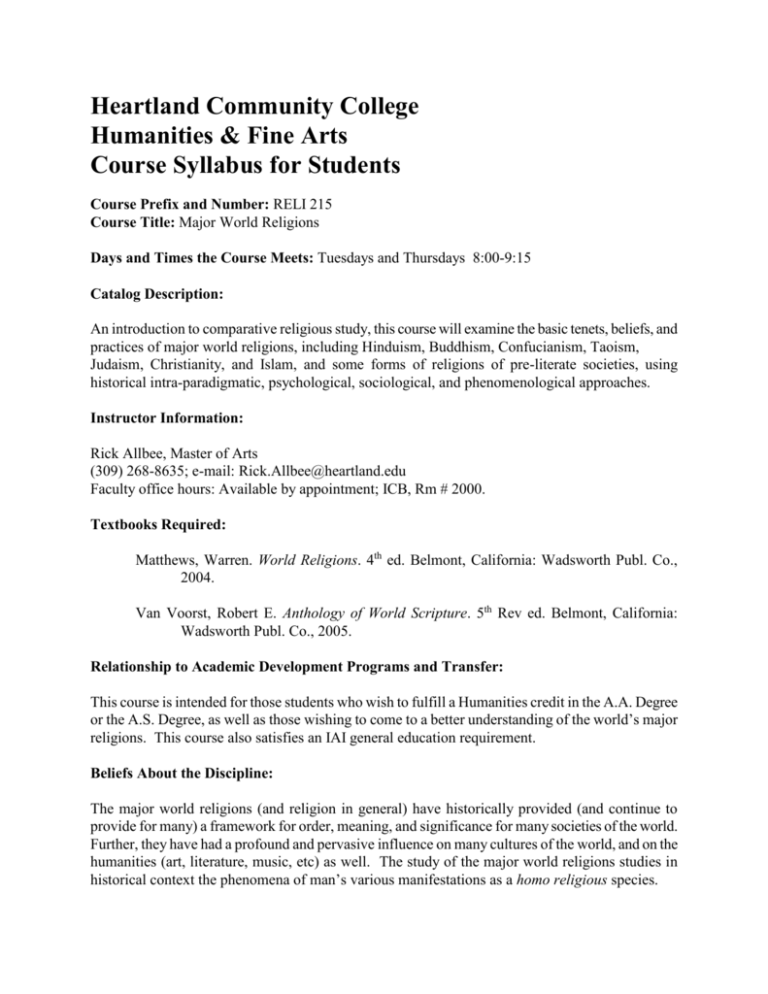
Heartland Community College Humanities & Fine Arts Course Syllabus for Students Course Prefix and Number: RELI 215 Course Title: Major World Religions Days and Times the Course Meets: Tuesdays and Thursdays 8:00-9:15 Catalog Description: An introduction to comparative religious study, this course will examine the basic tenets, beliefs, and practices of major world religions, including Hinduism, Buddhism, Confucianism, Taoism, Judaism, Christianity, and Islam, and some forms of religions of pre-literate societies, using historical intra-paradigmatic, psychological, sociological, and phenomenological approaches. Instructor Information: Rick Allbee, Master of Arts (309) 268-8635; e-mail: Rick.Allbee@heartland.edu Faculty office hours: Available by appointment; ICB, Rm # 2000. Textbooks Required: Matthews, Warren. World Religions. 4th ed. Belmont, California: Wadsworth Publ. Co., 2004. Van Voorst, Robert E. Anthology of World Scripture. 5th Rev ed. Belmont, California: Wadsworth Publ. Co., 2005. Relationship to Academic Development Programs and Transfer: This course is intended for those students who wish to fulfill a Humanities credit in the A.A. Degree or the A.S. Degree, as well as those wishing to come to a better understanding of the world’s major religions. This course also satisfies an IAI general education requirement. Beliefs About the Discipline: The major world religions (and religion in general) have historically provided (and continue to provide for many) a framework for order, meaning, and significance for many societies of the world. Further, they have had a profound and pervasive influence on many cultures of the world, and on the humanities (art, literature, music, etc) as well. The study of the major world religions studies in historical context the phenomena of man’s various manifestations as a homo religious species. Beliefs About Student Learning: Students who wish to succeed in this course will need to participate attentively and actively in class and seek with intention and effort to understand the class material. It is hoped that thereby you will enlarge and enrich your personal and intellectual horizons. Beliefs About Instructors Role: My role is to inform and educate you with regard to the major world religions. Further, I will seek to present the material in such a way as to meet you the college student at your present level of understanding, be interesting and relevant, and encourage you to stretch your horizons of understanding and appreciation. Course Objectives (Learning Outcomes): Students who successfully complete RELI 215 should be able to: 1. Define the basic tenets of Buddhism, Christianity, Confucianism, Hinduism, Islam, Judaism, Daoism, and religions of pre-literate societies. 2. Compare and contrast the ways in which different religions provide answers to certain fundamental questions. 3. Engage and demonstrate an understanding of the style and content of selected primary source sacred writings for each of the religions studied. 4. Explain the historical origins and development of each major religion studied. 5. Identify key figures in the origins and development of each major religion. 6. Describe various rituals and liturgical practices associated with each of the major world religions. 7. Compare and contrast the moral and ethical precepts advanced by each of the religions studied, as well as the problems addressed and the proposed solutions these precepts offered to their various historical social contexts. 8. Analyze the social and political factors associated with the practice of the religions studied. Course Outline: 1. Religions of Pre-Literate Societies 2 2. Judaism 3. Islam 4. Christianity 5. Hinduism 6. Buddhism 7. Confucianism 8. Daoism Description of Learning Format: The student should follow this procedure for each class: A. B. C. D. Read the assigned material Attend the lecture Participate in the class discussions and activities Review and study the material Method of Evaluation (Tests/Exams, Grading System): Course grades will be determined by the total number of points accumulated during the semester. Points will be assigned as follows: 4 Section Tests 1 Take Home Exercise Test 2 Text Book Quizzes 1 Short Research Assignment 6 Discussion Questions = = = = = The grading scale used to determine the course grade will be: 92 to 100% 83to 91% 74to 82% 65to 73% Below 65% =A =B =C =D =F 3 400 points 50 points 50 points 50 points 450 points Class Participation: Full class participation (attentiveness to the lecture, contributions to the discussions, active involvement in any group work) is encouraged and required. Class questions are encouraged. Policies on Attendance: The following requirements should be met: 1. 2. 3. 4. 5. Regular class attendance each week Steady progress in the readings and course work Completion of all assignments and exams If you miss class do not call; arrangements will be made upon your return Students with repeated and frequent absences may be dropped at the instructor’s discretion. Also, absences before a test may result in the student not being allowed to take the test. Incompletes: Instructor will follow the college policy on incompletes as outlined in the HCC student handbook. Extra Credit: Extra credit is not generally available, but is reserved for special cases on an individual basis. Missing an Exam and Assignments Policy: Exams are to be taken, and assignments handed in when they are due. The only allowances for making up exams and/or accepting late assignments are pre-arrangements made between the instructor and student, and/or excused absences (serious illness or death in immediate family). Required Writing and Reading: All readings from the textbook(s) should be completed prior to class in order to facilitate classroom discussion. Consult the course assignment and reading calendar below for specific readings. Assignments: The course assignments are: A) 4 Section Tests, B) 1 Take Home Test Exercise C) 2 Text Book Quizzes, D) 1 brief Library Research Assignment, and E) 6 Discussion Questions. All assignments are to be developed and completed independently by the individual student. None of them are in any way to be considered group work. Group study for the exams is okay. Cheating may result in failure of the assignment or of the course; the determination to be made by the instructor. 4 ASSIGNMENT AND COURSE READING CALENDAR 1. Religions of Preliterate Societies - Read: Matthews, pp. 1-75; Voorst, pp. 1-25. Text Book Quizzes Due 2. Judaism - Read: Matthews, pp. 273-324; Voorst, pp. 201-244. EXAM 1 1st Discussion Question Due 3. Islam - Read: Matthews, pp. 377-420; Voorst, pp. 285-322. 2nd Discussion Question Due 4. Christianity - Read: Matthews, pp. 325-376; Voorst, pp. 245-284. EXAM 2 3rd Discussion Question Due 5. Hinduism - Read: Matthews, pp. 77-122; Voorst, pp. 27-67. TAKE HOME EXERCISE 3 4th Discussion Question Due 6. Buddhism - Read: Matthews, pp. 123-170; Voorst, pp. 68-108. EXAM 4 5th Discussion Question Due 7. Confucianism - Read: Matthews, pp. 203-205, 215-230; Voorst, pp. 139-162. 8. Daoism - Read: Matthews, pp. 206-214; Voorst, pp. 163-176. FINAL EXAM (Tues, 8:00, May 16, 2003) 6th Discussion Question Due 5



